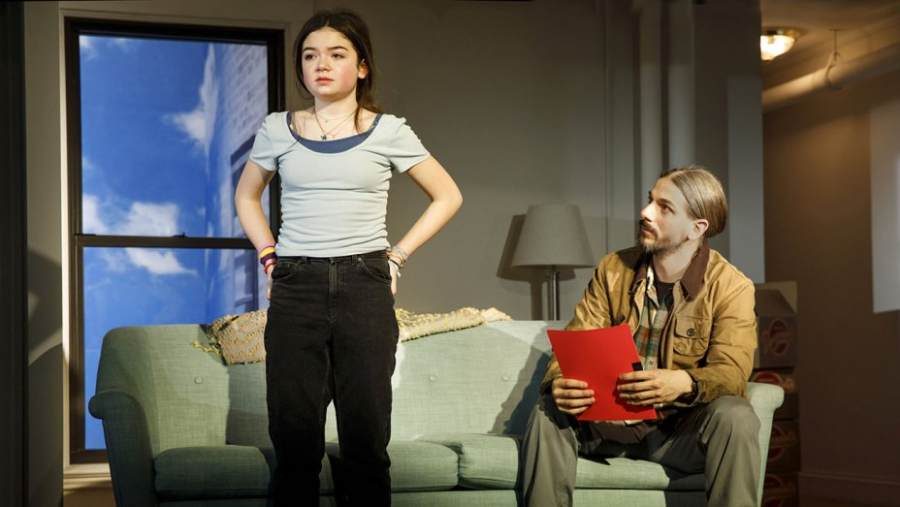

A great play is like a great voyage: terrifying in its vastness, simultaneously bewildering and thrilling. Such is the journey of Lindsey Ferrentino’s This Flat Earth at Playwrights Horizons, under the commanding and assured helm of director Rebecca Taichman. That there is a most exquisite and singular reveal near the end of this play, a heartrending coming of age story surrounding a middle school shooting, is one of Taichman’s trademarks and, like her Tony-winning Broadway debut with the miraculous play Indecent, the results here are thrilling.
I am a writer who loves to stand in awe of my fellow creatives, who have challenged us to see the world we’ve made anew. In our current zeitgeist, there are teams of creatives like Taichman and Ferrentino, who work from the heart and the mind simultaneously to cause you to reexamine your complacency and call forth your better angels. With This Flat Earth they’ve hit the mark precisely.
The plot revolves around Julie, a middle school girl (played with adolescent angst and white hot rage by Ella Kennedy Davis) who, with her buddy Zander (played with chivalrous charm by Ian Saint-Germain), has survived a school shooting. Their former classmate’s mother, Lisa, is a devastated neighbor (played winningly with a standout performance by Cassie Beck, who you may have seen in The Humans). Lisa ultimately informs the school board that Julie’s father, Dan, has been dishonest in gaining access to the school that Julie is not properly zoned to attend. During this controversial behavior, which brilliantly places the grieving mother in an unflattering light, the upstairs neighbor Cloris, a former cellist, offers sage advice and an exquisite final monologue as a denouement to the evening’s proceedings. Cloris is played by Lynda Gravatt, who with her staunch and humorous wisdom offers us a finely honed performance that brings us into the play’s deepest sorrows with grace.
At the play’s opening and in its final moments, our young protagonist Julie begins to ask what is ultimately the most profound question of all: Are you there? She’s calling out for her father (played with gently authority and handsome kindness by Lucas Papaelias) as she hears the upstairs neighbor’s cello music. The cello, gently played offstage by Christine H. Kim throughout, adds an air of soothing grace to the proceedings, which we find helps us with the tragedy of which we are about to learn. And with the beauty of great metaphor, as Julie's question resonates throughout the play, our questions begin.
Does Julie mean, is her father nearby? Does she mean, the musician? The audience? Is she asking: are we listening? Are we present? Do we care? The beauty and the wisdom of this question, married with the innocence of the young girl asking it, is devastating and perfectly stunning theatre, a perfect question for a human being alive in troubled times.
With brilliant scenic design by Dane Laffrey, the set becomes its own character, the fire escape being used to great effect; nothing is wasted or wasteful in this cozy theatre. The title of the play, which is part of a school assignment Julie never got to hand in due to the shooting incident, uncovers one more brilliant piece of writing as our final reveal (which I will not divulge). I highly encourage seeing this timely and politic play at Playwrights Horizons; Ferrentino and Taichman are a winning team to guide us to a brighter future, a new world, better than the one we’ve made.